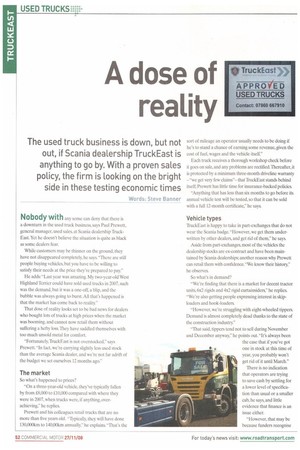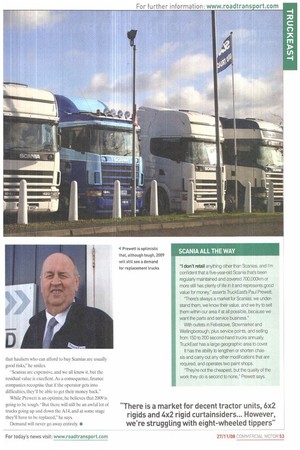A dose of reality
Page 52

Page 53

If you've noticed an error in this article please click here to report it so we can fix it.
The used truck business is down, but not out, if Scania dealership TruckEast is anything to go by. With a proven sales policy, the firm is looking on the bright side in these testing economic times
Words: Steve Banner Nobody with any sense can deny that there is a downturn in the used truck business, says Paul Prewett, general manager, used sales, at Scania dealership TruckEast. Yet he doesn't believe the situation is quite as black as some dealers fear.
While customers may be thinner on the ground, they have not disappeared completely, he says. "There are still people buying vehicles, but you have to be willing to satisfy their needs at the price they're prepared to pay."
He adds: -Last year was amazing. My two-year-old West Highland Terrier could have sold used trucks in 2007, such was the demand, but it was a one-off, a blip, and the bubble was always going to burst. All that's happened is that the market has come back to reality."
That dose of reality looks set to be bad news for dealers who bought lots of trucks at high prices when the market was booming, and cannot now retail them without suffering a hefty loss. They have saddled themselves with too much unsold metal for comfort.
"Fortunately,TruckEast is not overstocked," says Prewett. "In fact, we're carrying slightly less used stock than the average Scania dealer, and we're not far adrift of the budget we set ourselves 12 months ago."
The market
So what's happened to prices?
"On a three-year-old vehicle, they've typically fallen by from £8,000 to £10,000 compared with where they were in 2007, when trucks were, if anything, overachieving," he replies.
Prewett and his colleagues retail trucks that are no more than five years old. "Typically, they will have done 130,000km to 140,00km annually,he explains, "That's the sort of mileage an operator usually needs to be doing if he's to stand a chance of earning some revenue, given the cost of fuel, wages and the vehicle itself."
Each truck receives a thorough workshop check before it goes on sale, and any problems are rectified.Thereafter, it is protected by a minimum three-month driveline warranty —"we get very few claims"— that TruckEast stands behind itself; Prewett has little time for insurance-backed policies.
'Anything that has less than six months to go before its annual vehicle test will be tested, so that it can be sold with a full 12-month certificate," he says.
Vehicle types
TruckEast is happy to take in part-exchanges that do not wear the Scania badge. "However, we get them underwritten by other dealers, and get rid of them," he says.
Aside from part-exchanges, most of the vehicles the dealership stocks are ex-contract and have been maintained by Scania dealerships; another reason why Prewett can retail them with confidence. "We know their history," he observes.
So what's in demand?
"We're finding that there is a market for decent tractor units, 6x2 rigids and 4x2 rigid curtainsiders," he replies. "We're also getting people expressing interest in skiploaders and hook-loaders.
"However, were struggling with eight-wheeled tippers. Demand is almost completely dead thanks to the state of the construction industry."
"That said, tippers tend not to sell during November and December anyway," he points out. "It's always been the case that if you've got one in stock at this time of year, you probably won't get rid of it until March."
There is no indication that operators are trying to save cash by settling for a lower level of specification than usual or a smaller cab, he says, and little evidence that finance is an issue either.
"However, that may be because funders recognise that hauliers who can afford to buy Scanias are usually good risks," he smiles.
"Scanias are expensive, and we all know it, but the residual value is excellent. As a consequence, finance companies recognise that if the operator gets into difficulties, they'll be able to get their money back."
While Prewett is an optimist, he believes that 2009 is going lobe tough. "But there will still be an awful lot of trucks going up and down the A14, and at some stage they'll have to be replaced," he says.
Demand will never go away entirely. •




















































































































































